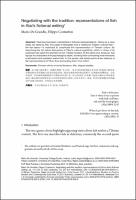Chapter Negotiating with the tradition: representations of fish in Alai’s fictional writing
| dc.contributor.author | De Grandis, Mario | |
| dc.contributor.author | costantini, filippo | |
| dc.date.accessioned | 2022-06-01T12:24:07Z | |
| dc.date.available | 2022-06-01T12:24:07Z | |
| dc.date.issued | 2021 | |
| dc.identifier | ONIX_20220601_9788855185066_618 | |
| dc.identifier.issn | 2704-5919 | |
| dc.identifier.uri | https://library.oapen.org/handle/20.500.12657/56433 | |
| dc.description.abstract | Tibet has long been orientalized in fictional representations. Taking as a case study two texts by Alai, this paper investigates how a traditional Tibetan cultural trait–the fish taboo–is mobilized to complicate the representation of Tibetan culture. By describing the fish taboo Alai points at Tibet's cultural specificity, which in virtue of its exoticism can catch the attention of non-Tibetan readers. At the same time, however, Alai equips his characters with psychological depth, showing their contrasting inner emotions of attraction and repulsion toward fish. In this sense, Alai subtly points at the fallacies of flat representations of Tibet, thus dismantling them from within. | |
| dc.language | English | |
| dc.relation.ispartofseries | Studi e saggi | |
| dc.subject.other | Chinese ethnic minority literature | |
| dc.subject.other | Alai | |
| dc.subject.other | disgust studies | |
| dc.title | Chapter Negotiating with the tradition: representations of fish in Alai’s fictional writing | |
| dc.type | chapter | |
| oapen.identifier.doi | 10.36253/978-88-5518-506-6.11 | |
| oapen.relation.isPublishedBy | bf65d21a-78e5-4ba2-983a-dbfa90962870 | |
| oapen.relation.isbn | 9788855185066 | |
| oapen.series.number | 233 | |
| oapen.pages | 15 | |
| oapen.place.publication | Florence |

